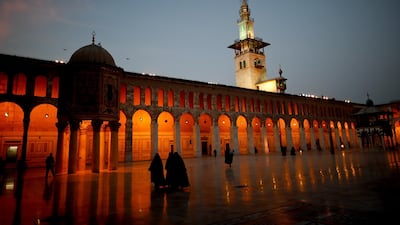Decried as an attempt to strengthen the influence of conservative Islam on Syrian society, a decree signed by President Bashar Al Assad on September 20 has caused a furore among Assad loyalists.
The 37-page-long decree known as n°16, which has been leaked online, revises the responsibilities and the internal structure of the Ministry of Religious Endowments (Awqaf), set up in 1961 to manage religious properties mostly associated with Sunni Islam.
Reactions on social media spread like wildfire, as many conflated the decree with religious extremism and the end of secularism.
“Is its purpose the Islamisation of institutions and the domination of Syrian people’s lives with regards to religious diversity?” wrote the most vocal critic of the decree, Nabil Saleh, a member of the Syrian Parliament, on his Facebook page. Mr Saleh is from Latakia, an Alawite stronghold. At no point does he directly criticise Bashar Al Assad, who is also Alawite.
Pictures posted on a page called “No to the Ministry of Awqaf’s legislative decree n°16”, created on October 2, depict a bearded man reading a Quran upside down as a black bird with “ISIS” written on it pecks into his head.
Another showed two happy young women sitting together in a field, reading the Quran and the Bible together, with “religion is for God and the nation is for all” written across it.
Rumours have spread that the decree stipulates that all Syrians must pay “Zakat,” a religious tax for the rich. But the decree only mentions Zakat in a short paragraph, saying it should be “encouraged”.
"These kinds of reactions are a mixture of a strong anti-Sunni feeling among Assad's Alawite base which has increased with the war and a basic misunderstanding of religious administration by the Syrian State", says Thomas Pierret, senior researcher at CNRS, the French national centre for scientific research, and author of Religion and State in Syria: The Sunni Ulama from Coup to Revolution (2013). "It's all pure fantasy".
Faced with mounting criticism, the Minister of Awqaf, Abdul Sattar Al Sayyed, answered questions about the decree on Syrian TV. In a video that has circulated on Twitter, he reads a paragraph from the decree that stipulates that one of his ministry's aims is to "fight Wahhabi and Muslim Brotherhood" thought. The decree is peppered with calls to religious "moderation".
______________
Read more:
Iran agrees $460 million power plant deal with Damascus
Idlib deal a step forward but Syria quagmire far from resolved
September saw lowest civilian casualty of Syrian war
______________
The decree does have one key objective, argues Mr Pierret: to strengthen the ministry’s role at the expense of the Grand Mufti. He is an Assad loyalist who has been accused of authorising tens of thousands of deaths in Syrian prisons these past few years.
Two lines buried in the middle of the decree drastically reduce his power: he is to be appointed by the president for three years only, whereas he previously held his job for life. Names of candidates will be suggested by the Minister of Awqaf, which is also a novelty. The fate of the current Grand Mufti, Ahmad Badreddin Hassoun, is not mentioned.
“It’s the result of a power struggle within the religious system. The influence of the Mufti and the minister used to be relatively similar”, says Mr Pierret. "What's at stake here is the control of financial donations to religious charitable institutions."
In a nepotistic move, the minister’s son benefits from the decree. His youth movement, created a few months ago, is mentioned, thus giving it official recognition.
On Facebook, Nabil Saleh likened the movement to the early days of the Muslim Brotherhood and said that it “violates the constitution”. Syria has a violent past with the Muslim Brotherhood, which was brutally suppressed in the 1980s.
“People started imagining that it was an Islamic movement that was taking hold of the ministry, but it’s basically a few dozen young volunteers who organise conferences in mosques to fight extremist ideas”, says Mr Pierret.
The decree will be debated in parliament in the next few days, a Syrian MP told The National, in what looks like a test of how different religious groups will co-exist in post-war Syria.


